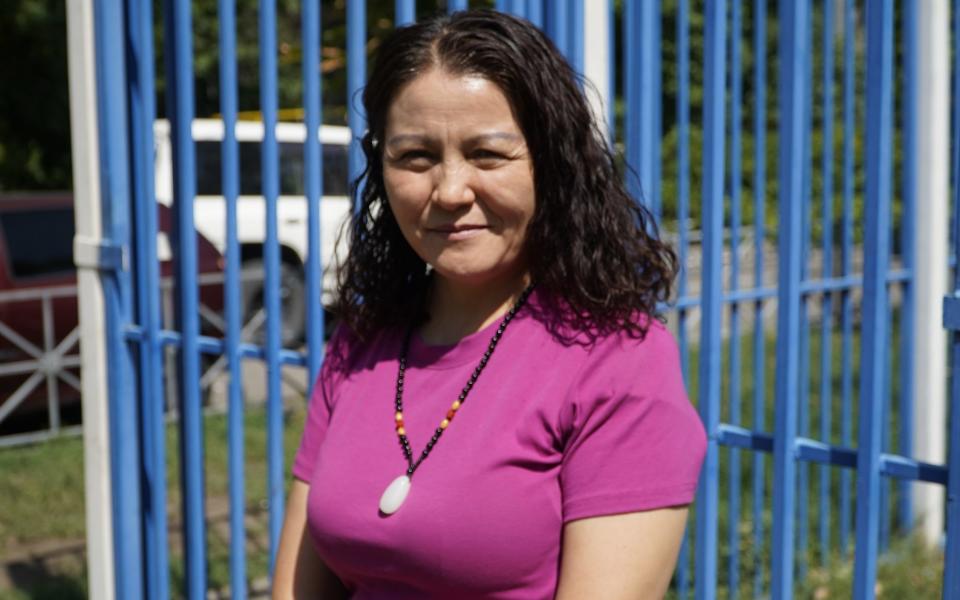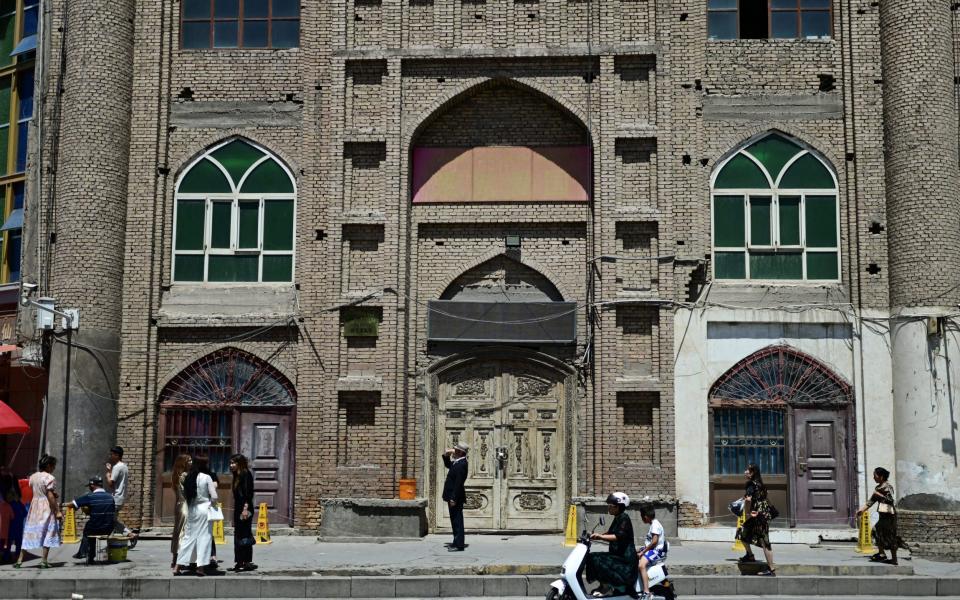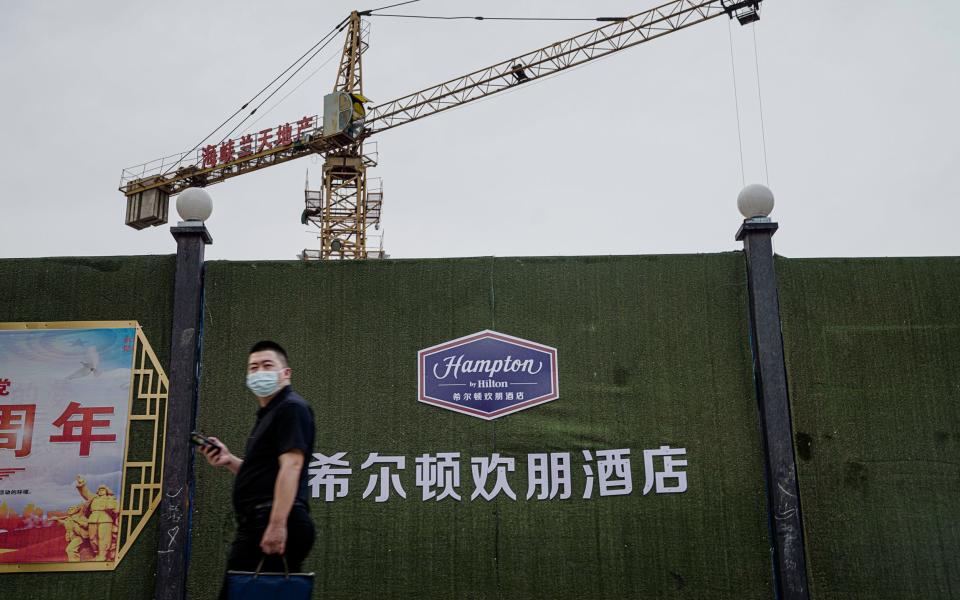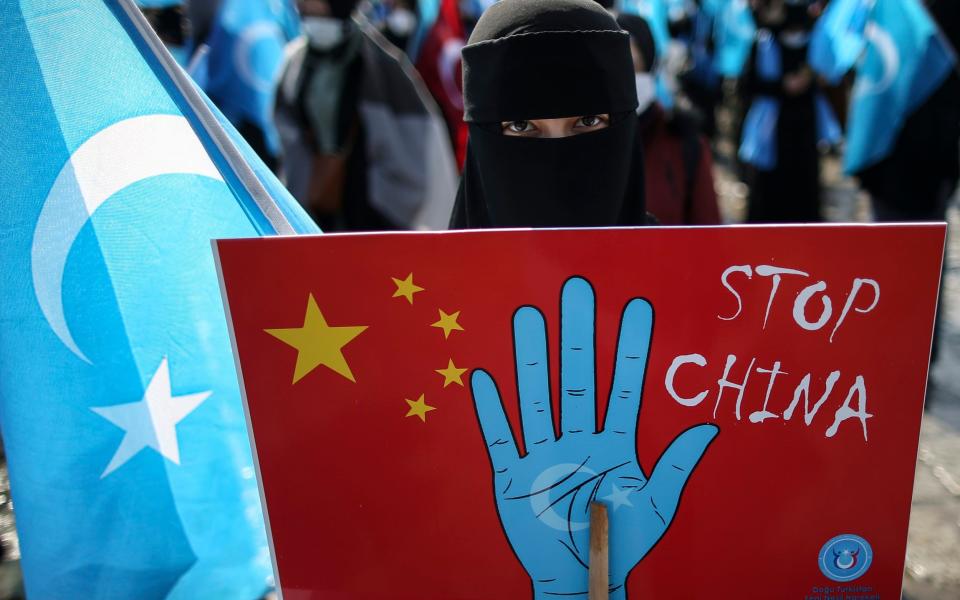‘We did it to our own people’: How China forced Kazakhs to implement its ethnic crackdown
Gulpiya Qazybek was on her way home from work in northwest China when she got a call telling her to return to the office.
The 46-year-old, an ethnic Kazakh from the Xinjiang region, worked for the local government ensuring families complied with the nationwide birth limits.
But that night, her instructions were quite different: she and a group of colleagues were told to go and round up 10 Muslim families in the neighbourhood.
“We were told to remove their shoelaces, belts, buttons,” Gulpiya told The Telegraph.
“Then, we had to escort them to the police, who bound their hands behind their backs, pulled a black hood over their heads, and loaded them onto buses.”
“No one knew where they were going,” she said. “Were they going to their deaths, or to ‘study’ in a ‘re-education’ camp? Would they return or would they disappear?”
It was March 2019, and China’s sweeping crackdown against Uyghurs, Kazakhs, and other primarily Muslim ethnic groups meant people were disappearing every day.
Families often had no idea where their loved ones had been sent - or even whether they were still alive.
Uyghurs and Kazakhs, like Gulpiya, were being forced to implement the crackdown in Xinjiang.
“Nobody wants to do that, but we had no choice…we were powerless,” she said. “The heaviest thing for us was that we had to do it to our own people – our brothers and sisters.”

Gulpiya’s account, which can be made public now that she’s no longer in China, provides chilling new details of how the Chinese state detained upwards of a million people in “re-education” camps from 2017 to 2020.
Hundreds of thousands of people received lengthy prison sentences for alleged crimes including praying, fasting, travelling abroad or having too many history books, according to leaked police records and former detainees interview by The Telegraph. The disappearances and jailings continue today.
Gulpiya’s responsibilities started to change in 2017 when mass detentions quickly increased across Xinjiang. China had begun its crackdown – nicknamed “Strike Hard” – three years earlier, claiming it was necessary to combat terrorism.
She was ordered to monitor 60 families and report specific information about them including whether they owned religious materials, Uyghur or Kazakh literature, or goods from foreign countries.
Even chocolate and soap were banned if they came from outside of China.
“We would write down their names… and send the list up the chain,” she said.
But Gulpiya realised something was wrong when people in those households started to disappear.
“[At first] I didn’t know why I had to make this list, but now, I realise that based on such information, a decision would be made at a more senior level about what to do with these people.”
“They were so scared of me because if I reported them up the chain, they would be finished,” she said. “But there was nothing I could do.”
Anyone with links to the foreign world could be detained as a “terrorist”.

By the end of that year, Gulpiya’s mother, Anarkhan Qanetbek, disappeared after three police officers bundled her into a car at a relative’s wedding.
“We didn’t know why she was detained, or where she had gone; we didn’t even have a right to ask where she was,” Gulpiya said. “Many of my siblings are also government employees, and I think they took our mother to control us, to pressure us.”
Indeed, anybody who refused to obey orders or opposed the government in its crackdown died or disappeared.
“Some would even die on the job and nobody knew why,” she said. “We weren’t allowed to question it.”
Eight months later, Gulpiya suddenly received a phone call, ordering her to visit a hospital.
When she arrived, she found her elderly mother cuffed and shackled to a bed. Shortly before she disappeared, Anarkhan had been diagnosed with a brain tumour, and her health was failing.
Gulpiya didn’t have much time to speak with her mother – Chinese authorities only wanted her to pay for medical treatment.
“When I said goodbye, she whispered in my ear, ‘Save me, my child, save me; they beat me’. She looked so helpless, like a child.”
That was the last time Gulpiya saw her mother.
The following year, Gulpiya’s brother suddenly rang. Court representatives had visited him to say that their mother had been sentenced to 12 years for praying.

Gulpiya herself had become familiar with these harrowing and heartbreaking visits. She too had been tasked with informing families of these prison sentences. Sometimes, she was even present when Chinese security dragged people from their homes.
Once, she was unable to hold back her tears as she watched police arrest a young man in his 20s.
“It was so hard to bear,” she said. “That day I couldn’t control myself anymore. I wanted to cry, and to embrace them, because I’m a mother, too. But I wasn’t allowed to cry in front of them like that.”
“We all know those people didn’t really break the law,” she said. “And the elderly – how could they really be committing crimes?”
“Seeing them get arrested, I knew there was a chance I could be arrested, too,” she said. “As a woman, what if someone raped or assaulted me while I was in prison? What would happen to my children?”
A few times, Gulpiya even had to enter “re-education” camps to check up on the detained members of the 60 families she and her colleagues had been responsible for monitoring.
“I could see that my supervisor was also scared to go, even though he was Han Chinese [ethnic majority],” she said.
Detainees would beg her for news of their children or their spouses.
“If these were regular, normal ‘education’ centres, would people be going mentally insane? Would young women be getting pregnant? Would people be dying?”

Government officials from Beijing also visited Xinjiang about once a quarter to monitor work done by Gulpiya and others – evidence, she believes, that the most senior level of the ruling Communist Party knew exactly what was happening, and supported the crackdown.
Chinese propaganda has since claimed that local officials in Xinjiang took things too far – a way to scapegoat them as global condemnation grew – and that the central government would get things under control.
As time passed and the crackdown showed no signs of letting up, Gulpiya realised she and her family had no choice but to flee China.
She applied for a passport from the Chinese government, saying she wanted to seek medical treatment in Kazakhstan. This was more or less true – Gulpiya had suffered from heart issues and had been hospitalised in the past.
But even the act of requesting a passport could be considered a crime, punishable by being thrown in “camp” as interest in travelling abroad, again, was considered by the authorities as a sign of “terrorist” behaviour.
On the day Gulpiya was called into the government office to find out whether passports had been granted for her, her husband, and their children, she took painkillers with her – a way to commit suicide if she was indeed arrested.
In the end, the authorities approved the passports – but only after she signed a declaration that she wouldn’t tell anyone outside of China what she’d seen in Xinjiang.
Unknown to her at the time, international pressure was growing against China over its “re-education” camps. The government was trying to whitewash the horrors by releasing some people and allowing others to leave the country – if they pledged to stay quiet about what they knew.
In May 2019, Gulpiya and her family left their home in China hours before dawn, heading west to the border to Kazakhstan.
“All the way, I was in fear. I thought that the police would chase after me, and force me back,” she said. “I was so worried until we crossed the border.”
The minute Gulpiya set foot in Kazakhstan, tears began streaming down her face.
Despite having left so much behind – her mother was still in prison, and her siblings and their children remained in China – she finally felt safe for the first time in many years.
“I didn’t know what the future would bring, but I was just so happy to be here [in Kazakhstan].”
It was a relief to no longer have to worry about what would happen to her young children if she had been detained.
“When we first came to Kazakhstan, for some time at night, I would wake up in horror, remembering how people cried there, and all that we have witnessed.”
Gulpiya now runs a small tea shop on the outskirts of Almaty, Kazakhstan’s largest city, and campaigns relentlessly for the Chinese government to free her elderly mother.
She, along with a handful of other holdouts, regularly gather outside the Chinese consulate to stage protests, demanding their relatives be released.
Beijing still tries to intimidate her into silence.
Authorities visit her siblings in China near-daily and have threatened to have Gulpiya kidnapped and brought back into China.
They even suggested that Gulpiya and her siblings arrange to meet in Khorgos, a special economic zone that straddles the border between Kazakhstan and China. She thinks it’s a trap: others have been kidnapped from that no man’s land.
“People might wonder why we didn’t try to save people…There was no way for us to save each other, even though we disagreed with the policy,” Gulpiya said. “How can you save someone if you yourself are being persecuted, too?”

